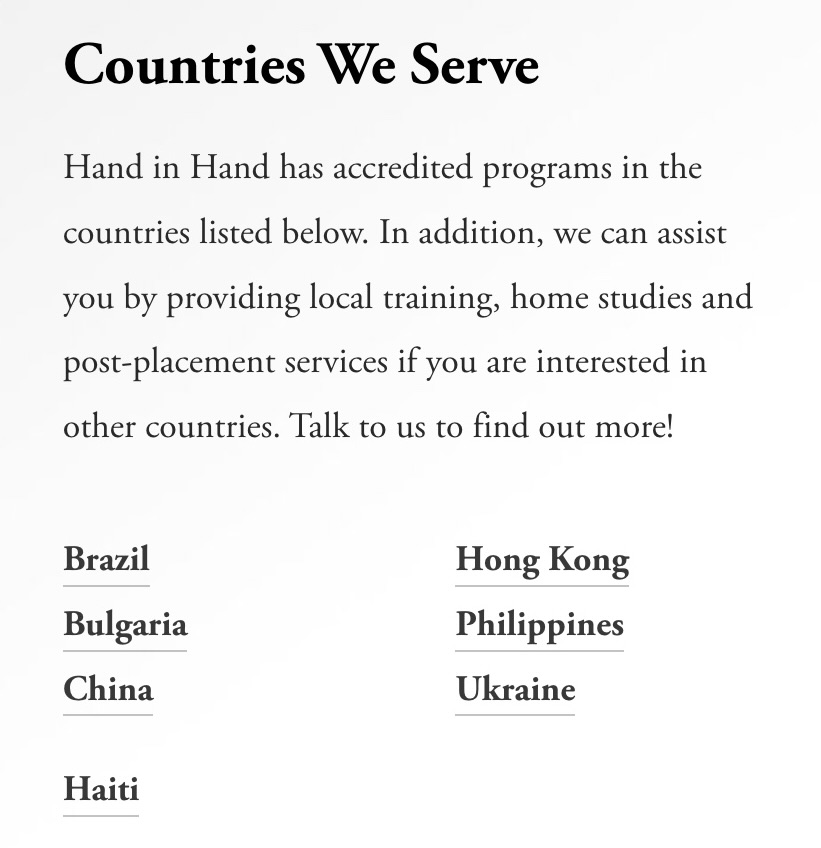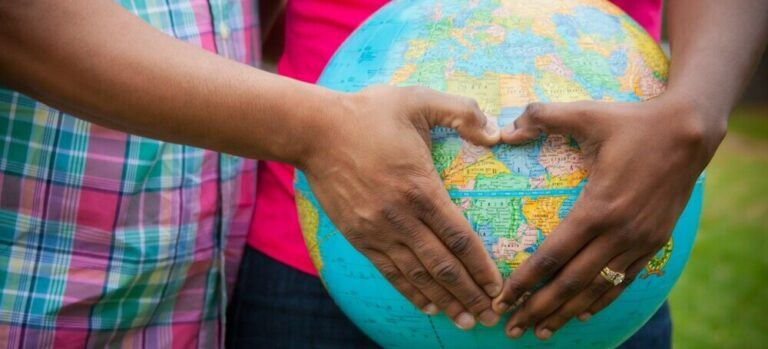How to Adopt a Child from Haiti
Adopting from Haiti is a straightforward process that requires a lot of time and dedication. Once you are connected with an international adoption agency, case workers will walk you through every adoption requirement. They will also be the ones to update you on your progress.
Before describing the steps involved in adopting a child from Haiti, I want to speak to those who may be considering adoption. This is one way you’ll know if the choice to adopt is right: There’ll be this tug at your heart strings and a tingling conviction that feels like a unique call to something good, combined with a wide-eyed wonder that this is where your life has led you. There will be questions flitting across your brain like schools of jumpy fish, but underneath that, a deep lake-like stillness of peace and knowing. You will know. If this description fits you, feeling those feels while reading this, I would urge you gently to take the next steps. Even if you don’t know how it will all work out yet, take them. It WILL work out. Because these children need a home, and you are that loving place. ❤️
Now on to the official how-to!
- Find a Hague-Accredited International Adoption Agency
Don’t worry, even though the adoption realm is full of new terms and (in)famous names of paperwork, I’ve got you covered. “Hague” is referring to a group of international laws, many of which are in place to protect adopted children from human trafficking. If you’d like to read more about the specifics, try the department of state’s article here: understanding-the-hague-convention.
So, if an agency is Hague-accredited, it means that they are in compliance with important international laws. As you are exploring various agencies and what they have to offer, you will likely see something like the blurb below:

To keep things simple, you will probably want to search for agencies that service where you live (although agencies can also work with other local adoption agencies to take care of your home study and other needs, so if you feel great about a particular agency, reach out to them!), and also international agencies that facilitate adoptions from the country you are hoping to adopt from. So in the case of this example, you’d make sure that the agency facilitates adoptions from Haiti.

Once you’ve researched the possible agencies that make sense (there will probably only be handful of them), spend some time reading about them on their website, thinking and praying about your decision, and perhaps joining groups like Adopting From Haiti on Facebook to get a feel for how things might go. You may want to compare agencies on items such as how long their process takes, the cost of the adoption, and what the adoption process entails. Then, when you are ready, contact your chosen agency! They will walk you through every step of the process from the moment you reach out to them, to the moment you officially apply, to the moment your beloved child comes home.
Don’t be discouraged if this process takes a little time, it was almost 3 months for our family from the moment we decided to pursue adoption to the day we officially put in an application. It is not uncommon for there to be an application fee (ours was almost $1000), so that may also factor in as to when you apply. My best advice is to reach out and begin the dialogue no matter where you’re at in the adoption process, even if you’re just thinking about it and not committed at all. Many agencies have adoption info sessions you can attend physically or virtually.
- Work With Your Agency to Find and Apply For Grants
I highly recommend working with your selected agency in the process of applying for grants. They will know which ones will be best suited for your situation. We had a video call within the first few months where we determined the best course of action, and wherein we were assured that lack of finances needn’t be the thing that kept us from adopting. The director I spoke with said that if we felt like this was right, he would go “scorched earth” to help us procure the funds we needed. This has proven to be true! We have reached out at various times when funds were needed and he facilitated us in procuring multiple grants.
You can absolutely google adoption grants and find and apply for anything you want, just make sure you’re using your agency as a resource as well. In some cases they can use their professional network connections to help get your case in front of the right people and keep things moving forward.
A particular grant provider to keep in mind when adopting from Haiti is Children Need Families. Children Need Families was started in conjunction with Operation Underground Railroad as a means to help vulnerable children. For particular countries where children are most at risk, Children Need Families steps in to help cover the costs of those children being adopted. In our adoption journey, we actually spoke to Children Need Families first because we were so concerned about having the funds necessary to adopt a child internationally. After hearing from them, I knew that I was proceeding in a way that would be most likely to qualify for a grant. You can email them at childrenneedfamilies@ourrescue.org, or simply mention them to your adoption service provider. Children Need Families provided the most generous grant on behalf of our adoption.
- Prepare to Be Buried In Paperwork
There will be much paperwork. It is stressful; there’s really not a way around that. In our adoption support group we have discussed that whenever we feel urgent about our adoption process and we feel like we should work on it, it’s the best time to heed that intuition. When you feel like it’s time to push and get things done, push and get things done. If you’re not sure what to do next, ask your caseworker, or others who are also adopting. Hopefully you can be connected quickly into a circle of people all going through the same thing as you. If the agency doesn’t facilitate that for you, it might be worth asking if you can connect with others who are undergoing the process. When tasks are in front of you get them done as you can, when they are not, tend to other aspects of your life until the word comes again that there is something you need to do. When you feel like you’re not getting things completed fast enough take heart, I have been there, but it does get completed in time. It will all be behind you one day.
There is also the home study which is not nearly as stressful as it seems. I am sure each agency is different, but for the most part it’s just a basic glance at your home to see if it is cared for and sufficient, then mostly questions about your life and your relationship with your spouse. You don’t need to live in a mansion (we live in a 2-bedroom apartment) or have everything pristinely organized. This is one of those life events where the old adage “just be yourself” comes to mind. Don’t worry, they are most likely to find your heart and home quite good enough to welcome children in.
Other events included with the initial paperwork process are: getting fingerprinted locally and once a bit further away at an assigned appointment, procuring notary signatures, medical examinations for every member of the family, receiving required medical tests and/or vaccinations, and a psychological evaluation for both spouses.
Phew. It is something else. ha ha Not to mention a lot of the time you’re not sure exactly how to fill out these legalese papers but YOU GET THROUGH IT! Woot! And then you are done.
- Receive a Match!!

Our family was matched with 3 siblings in an orphanage in Port-au-Prince, Haiti on Dec. 1, 2022. We had known that we were getting closer to receiving a referral but didn’t know the exact day. All of the thrill and excitement you can imagine after year and a half journey up to that point was there. A short description of them in an email is what we received first, followed by the Haitian Creole versions of their files later that day. When I read the names of these 3 children I felt a warm confirmation in my heart that they would become a part of our family. My husband said it felt similar to reading a mission call from the Lord, where you know that this is where the next chapter of your life is going to take you and that it is right, good, and sacred.
We received the English translation of their files about a month later and enjoyed reading more about their personalities and situation. They are smart, outgoing children whom we cannot wait to meet! When I read the section of their files describing their birth mother’s reasons for surrendering them my heart was drawn to her in an unbreakable way. I spent many moments thinking of her, feeling connected to her, and crying tears for the difficulties she had to face. International adoptions are closed adoptions for the most part, but Miles and I hold out hope that after the adoption is complete perhaps we can reach out to her and support her in some way.
There was only one picture of each child in the files that was 3 years old, fuzzy, and without much expression. You can imagine that we were desperate to find more pictures or videos of them to really get a feel for what they are like! The picture of our then 4 yr old was his baby picture! After some searching I was able to find a Facebook group that was for our specific orphanage, and where updated pictures are posted! It was surprisingly difficult to identify them and I still could not recognize the youngest for sure until we finally saw him on a google meet call 6 months later.
- Meet, Prepare, and Wait
The google meet call mentioned above was our official socialization visit! Present at the call were a) the children with the orphanage director, b) our adoption agency’s Haiti Adoption Specialist who served as translator, c) Miles and I, and d) an official from the Haitian government office IBESR. The standard in many international adoptions is that you travel in person to the country to meet your children (which may immediately precede you bringing them home to your country); however, in Haiti it is currently too dangerous to travel. At the time this article was written all Haitian socialization visits were conducted virtually.
Interestingly, in this meeting you don’t spend a lot of time interacting with the kids directly. The Haitian government official asks several interview questions in order to complete the necessary “Article 5 Interview”. These questions are similar to questions asked during the preparation of your home study. To me they were redundant, but you do what you need to do! We had a few minutes before the official from IBESR joined the call which was a joyful time of finally smiling into each other’s faces and saying hello.
Other zoom-call-type visits and pictures sent to you are possible depending on the preferences of the orphanage director where your children reside.
After receiving your referral (aka match) there are some more papers to complete and the bulk of your adoption fees are due. We spent some of those first months after the adoption fundraising, raising our own funds, and applying for grants until we were able to gather the necessary amount. It became urgent and stressful all at once a few months after accepting the match, so my advice if you are adopting is to not delay! Those funds really are due so work to get them sent in as soon as you can.
After the finance scramble is done and the last required paperwork is submitted, then comes the wait while necessary processes are completed. Haiti’s wait can be long, it varies widely depending on the agency. For us we are anticipating the children coming home around summer 2024, but that is not guaranteed.
For us this has been the slowest part of the adoption; there’s not much to do and word on how things are advancing is scarce. The advice we’ve received for this time is to use it as a time to prepare. This may include learning Haitian Creole (optional, not required), reading books on adoption, preparing your home space, role-playing scenarios with your current children, etc. Hey you might even start a blog. 😉 As in earlier times, the professionals with your adoption agency will walk you through any items of business you need to take care of. At every point in the process you are well-supported!
- Receive a Travel Date

Eventually when everything is complete you will receive an official travel date. When we receive ours I will let you know how much time we had to know about it beforehand! We will travel to Florida to pick up our adopted children who will be brought there by an escort in order to keep everyone safe.
Then the adoption will be complete!! You will spend some intentional time together as a newly joined family (called cocooning), chauffer the kids to medical check ups, get them set up with the schooling options of your choice, and start your new adventure together as a family!
And when you do, may your family bond be unbreakable. 💙







Adopting a child is an act of love and faith. So I thank you to detail all the steps to adopt a child in Haiti. It’s true that there are many poor children there who deserve to grow up in loving and caring families and to get more opportunities. But you must be careful about some agencies which are front for child trafficking. In France, there was a huge scandal with an organization taking children from Chad and getting them in very nefarious networks.
Thank you for your thoughts. I agree that you do have to proceed with any adoption very carefully, there are many scams and untrustworthy organizations. The hague laws they have now help reduce the potential of children being trafficked, but each person should still conduct careful research and trust their intuition.
Adoption is a huge process that ends in such a beautiful bonding. Embarking on adoption is like weaving a tapestry of compassion, does that make sense? That’s how I see it. As individuals navigate paperwork, agency choices, and grants, there’s a heartfelt Zoom moment where our lives intertwine and change forever. The wait becomes overwhelming (in the best possible way) towards preparation, leading to the eagerly awaited travel date and the start of an unbreakable family bond. I’m from PR and I’ve been in foster care. It’s sad how many people think that adopting will make life complicated if the child is over the age of 5 because they think that there might be something wrong with said child. I’m glad you wrote this post and made a stable point of how smoothly and beautiful the process of adopting a child from Haiti can be.
Thank you Stephanie! I agree, kids older than 5 need to be supported, believed in, and cared for. Your perspective is comforting. I’m going to keep close the phrase “Embarking on adoption is like weaving a tapestry of compassion”. That is so beautiful. Thank you for sharing your thoughts!
I gotta say, this got some really helpful information. I like how it breaks down the process step by step, making it easier for people who are interested in adoption to understand. Though I have never tried adopting a child but I did once or twice went to an orphanage. Seeing those kids looking for someone whom they can love and or be loved, must be really sad for them not to have. So your mention of the importance of cultural sensitivity just makes it even more in depth since in some countries maybe some parents express their affection differently. However, I would have loved to see some personal stories or experiences from people who have actually gone through the adoption process in Haiti. Hearing real-life accounts can be inspiring and provide valuable insights. Overall, though, it’s a solid guide for anyone considering adoption from Haiti. Keep up the good work!
Thank you for taking the time to write your thoughts Michelle! That’s a good point about how families express affection in different ways. I love your advice on getting some personal stories; it makes me want to invite some guest authors to come share their adoption experience here on the blog! This guide is more of a technical one, but my husband and I are also in the process of adopting from Haiti ourselves. ❤️
It is so good to know that there are good people in the world who can do good to make life easier for others providing them with what is needed to survive and to have a healthy and productive life. Adopting a child shows acts of love and kindness, thanks for sharing because I am sure that the information that you have provided will educate people on how to adopt a child from Haiti.
I sincerely hope that anyone who wants to adopt will be able to find their way through questions, challenges, and concerns that arise. There are so many ways to do good and make this world a better place! Thank you for your kind words!